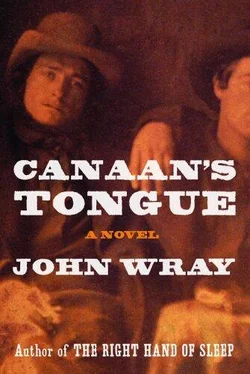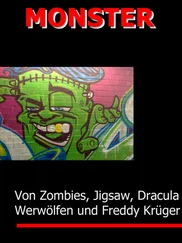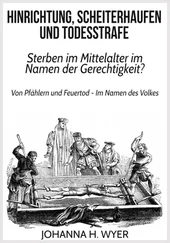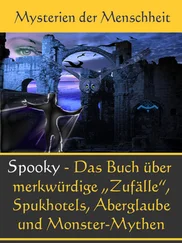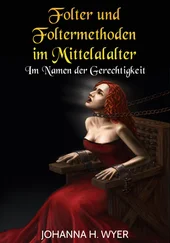COLONEL —Give it over, Asa—; give it here to me. (SOFTLY) — Take it from him, Virgil.
TRIST —I’ll give it to you! Here it is, Grandfather. You keep playing at your history, Mr. Ball.
COLONEL —Thank you, Asa. (PAUSE)
TRIST —Is it addressed to you, God-father?
COLONEL —Good lord, Virgil.
TRIST —Virgil’s busy at his memoirs.
COLONEL —Go find Kennedy, Virgil. Go and find him straight-away.
TRIST —Yes Mr. Ball leave off now of your papers and fetch that black frightful Irishman. That black black fearful man. (RISING) — Lay down with me now, Colonel. We’ll all of us lie down together. Lie down flat.
COLONEL —Run and get him, Virgil! Virgil! Do you hear?
HERE COMES KENNEDY TO KILL ME, Delamaresays.
When I come out of the woods he’s laying for me with eyes like chips of dead gray mud. He has nothing in his hands, no club or knife or bottle-end, but I know from his far-away look what it is he’s after. He brings his left hand up, just slightly, to fix me in his sight. He might be preparing to render me in oils.
“Off chasing Federals, were you, blacks?” he says. “Or was it rabbits?”
I keep my eyes steady on his hands. “Why not get your shot off as I came out of the brush?”
“Ah! I wanted to look at you, Oliver.” He slaps playfully at his hip. “Besides, I might’ve dropped a Yank by accident. I’d never of forgave myself.”
Now he is holding his hands out for me to see.
“You’ve looked at me,” I say. “Now you can shoot.”
“Right,” says Kennedy. “Yes.” But his hands keep still. In his dirty buck-skin breeches with his dirtier body inside them he seems perfect to me—; consummate. There stands Kennedy, come to kill me. He wears his purpose like a crown.
“Been waiting on this to fall down on us, ain’t we, blacks. Ever since I muh! — muh! — mancipated you. And here it is.”
“Get your pistol out, Irish.” His hands are red, not yellow like the rest of him. They open and close like little bellows. “Get it out, or let me by. I’m late for an appointment.”
He laughs. “Ah! I could never let you go now, pretty fellow. You’re a fugitive of society, on account of murder.”
And then it makes itself known, like a pane of beveled glass laid against my chest—: the knowledge that he will kill me. The likelihood was there always — he’s put so many under — but until this moment it was no more than a thought. Now it fills my mouth like spittle.
“I had no part in Harvey’s death,” I say, but my voice has gone careless. Harvey is of no consequence any longer. Here stands Kennedy, come to kill me. Nothing else has truth to me, or weight.
He hears it in my voice, my willingness to let him, but still he makes no movement—: there’s a chance I’d get a shot off as I fell. I watch Kennedy consider this. He bunches his face together. He’s remembering my repeater and my youth.
“I’m an old cunt, blacks, it’s true.” He chews thoughtfully on his lower lip. “An old Irish.” He squints at me, then opens his mouth wide. “Half my tuh! — tuh! — teeth’s dropped out. Right? But look at yourself, now. You’ve still got juice between your legs.” He shuts his mouth and gives a little groan.
“I didn’t do Harvey,” I say quietly. “You know I didn’t.”
His eyes go narrower still, then shut for half an instant. I could have drawn on him just then.
“I’d kill you any-road, blacks,” he says. “But we’re all good and satisfied you did. I’m acting under orders, as it happens.”
I take a step. “Whose orders? D’Ancourt’s?”
His eyes fly open and his left arm jerks—: not his shooting arm but the other. If killing me were a drink he’d be wiping his mouth already. “’Tweren’t him I got my orders fuh! — fuh! — from.”
“Who, then? Parson?” I laugh in his face. “Taking orders from Parson, are you, Irish? What would Saints Patrick and Ebenezer say?”
“It were Virgil Ball,” he coos.
In spite of myself I flinch. “You’re lying. Virgil has no truck with you, Kennedy. Virgil would sooner—”
“Precious young yet, aren’t we, blacks. Not yet at the ripeness of our years.” He sniggers. “Too much white meat. Not enough porridge.”
The hinges of my nature begin to creak. I was born unable to hold my temper and God knows it and Kennedy knows it better. It’s for this that he’s kept me alive, worrying me, goading me, with his hands out in the open where I can’t help but watch them—; when finally I drop he wants it to be with foam at the corners of my mouth. And I know that I will drop, that I will give him that satisfaction, and still I can’t keep my temper in its britches. Could Virgil truly have sent Kennedy after me? Is he so cankered-through with bitterness? Kennedy is the lowest of God’s creatures but I’ve never yet heard him lie. What does Virgil think he knows? He saw me yesterday arguing with Harvey about the debt and the Redeemer and Christ knows what all else. Everything but that whore Virgil trails after in her calico shift. Might that be why—? Her smell’s run through my linens even now. I’ve never sought out her company, God knows, but perhaps Virgil doesn’t. Might that be why? It might. But Kennedy—
“I was thinking, blacks,” Kennedy says, digging a thumb into his eye. “About the day I come across you.” He grins. “Should’ve known then that it would come to this.” He coughs. “Perhaps I did.”
This, the old topic—: tried and proved. The old item. The house and the fat copper still and the curtain behind it and that filthy soot-stained room. The smell of boiling mash. My fists begin to open.
“I’ll not quickly forget that day, little man. Christ! Coming down the steps into that stinking kuh! — kuh! — kennel, saying my hellos to your mother, yanking the curtain back—”
Mother Annie Bradford. Mother Anne. She is coming toward me now in the half-dark of the hall and I try my best with her smell still on my clothes but the smell of the mash is stronger and my fine clothes are off, away, as if they’ve never been—
“Oliver,” says Kennedy. “Oliver De — la — mare.” Drawing it out, letting the pieces of it break off and fall steaming and abominable to the ground.
By God that woman was not my mother.
“—and here’s little buh! — buh! — blacks with his drawers about his ankles, scarf tied back around his arms. A lady’s rag. Why was that, now, blacks? Feared of falling in?”
Dearest madam, you who took my life—
“That were the cunt you come out of. Weren’t it, blacks?”
The forest lifts before me like a petticoat and I fall sideways into running. My jacket and waist-coat and repeater are nothing but burdens to me now and I cast them aside. The smell of the mash keeps me on my feet and I reel drunkenly forward and all the while I hear him hollering to stand where I am and let him. Blank air opens ahead of me, parts as fast as I can run, a peep-hole waiting to be plugged. My mouth opens and six years tumble out of it and still I smell the mash.
Past the trees is the great house, Virgil and the rest inside of it like mice inside a shoe. Kennedy comes after. The scarf was blue crêpe and it was a reward. Fine things, she said. Which she? She of the fat white belly, the sweet-meats, the sweating copper pipes? She of the sour mash? The Redeemer’s she, or Virgil’s? She who made me white, or she who made me black? A branch breaks just behind.
I have ever been a poppet for the ladies.
Читать дальше
